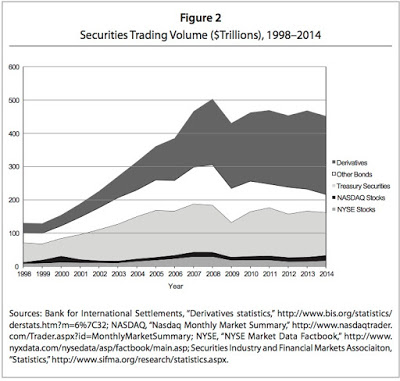Summary:
The volume of financial transactions has stabilized since the Global Financial Crisis of 2008, but remans at very high levels, as shown in the figure below. With GDP at about 18 trillions the volume of financial transactions is about 25 times the size of GDP. The potential problems associated to a hypertrophied financial sector. Yuge! The source is this paper that discusses the possibilities of a financial transactions tax (FTT), something that has been proposed by Bernie Sanders. And as the authors note: "The revenue potential of a FTT stems from the enormous volume of nancial transactions, which have a value many times GDP."
Topics:
Matias Vernengo considers the following as important: financialization
This could be interesting, too:
The volume of financial transactions has stabilized since the Global Financial Crisis of 2008, but remans at very high levels, as shown in the figure below. With GDP at about 18 trillions the volume of financial transactions is about 25 times the size of GDP. The potential problems associated to a hypertrophied financial sector. Yuge! The source is this paper that discusses the possibilities of a financial transactions tax (FTT), something that has been proposed by Bernie Sanders. And as the authors note: "The revenue potential of a FTT stems from the enormous volume of nancial transactions, which have a value many times GDP."
Topics:
Matias Vernengo considers the following as important: financialization
This could be interesting, too:
Stavros Mavroudeas writes Financialization Hypothesis: A Theoretical and Empirical Critique Author(s): Turan Subasat , Stavros Mavroudeas Journal: World Review of Political Economy vol.14 no.2
Nick Falvo writes Guest editorial: Homelessness in Canada
Nick Falvo writes The Minister of Housing’s Mandate Letter
Matias Vernengo writes Review of Keynesian Economics issue on Financialization
The volume of financial transactions has stabilized since the Global Financial Crisis of 2008, but remans at very high levels, as shown in the figure below. With GDP at about 18 trillions the volume of financial transactions is about 25 times the size of GDP. The potential problems associated to a hypertrophied financial sector.
Yuge!
The source is this paper that discusses the possibilities of a financial transactions tax (FTT), something that has been proposed by Bernie Sanders. And as the authors note: "The revenue potential of a FTT stems from the enormous volume of nancial transactions, which have a value many times GDP."

